Quantum Technology Hubs
The NQTP approach to commercialising quantum technologies is based around five hubs, each with a university at the centre and representing broad areas of focus.
The EPSRC Quantum Research Hubs were initially established in 2014, with the third phase of hubs currently being funded.
The hubs act as the engine for UK quantum ambitions, driving research and innovation at regional, national, and international scales. Formed in partnership with industry, the QT Hubs adopt a hub and spoke model which connects the UK QT’s community across every UK weaving the science of quantum technologies with ideas for their commercialisation and delivering a route to market. Each hub brings together experts from universities, national laboratories, business development and industry partners to steer a proposed development. The result of this organised collaboration to clear commercial goals is the key underpinning to the UK quantum community and the emerging industrial sector.
Please contact the appropriate hub, details below, if you want to collaborate or partner.
QEPNT – UK Hub for Quantum Enabled Position, Navigation & Timing
Contact: info@qepnt.ac.uk
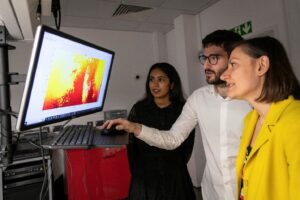
QEPNT is the UK Hub for Quantum Enabled Position, Navigation & Timing. The Hub brings together industry, academia and government to create quantum technologies which will be key for national security, critical national infrastructure and sectors such as aerospace, transport, energy, finance, communications and agriculture.
Central to the success of the Hub is the community of world-class researchers from institutions throughout the UK. We work with government and industry to co-design solutions to address the challenges facing our world today.
Maintaining the integrity of the UK’s security and infrastructure through cutting-edge research is at the heart of the QEPNT Hub. We’re developing technologies that will harness the power of quantum timing and position sensors to allow us to free ourselves from our reliance on satellite positioning and help to make the UK a more secure, and technologically-advanced nation.
The Quantum Biomedical Sensing (Q-BIOMED) Research Hub
Contact: info@qbiomed.org

The Quantum Biomedical Sensing (Q-BIOMED) Research Hub is the UK’s first quantum hub for biomedicine. Uniting world-leading expertise in quantum science and biomedicine from six universities, NHS trusts, and a network of charity, government, and industry partners, Q-BIOMED aims to pioneer the next generation of quantum sensors to revolutionise the early diagnosis and treatment of diseases such as cancer, Alzheimer’s and cardiovascular disease.
The Hub will accelerate the development of new quantum sensors for medical imaging, ultra-sensitive quantum-enhanced in-vitro diagnostics, novel surgical treatment interventions, and quantum sensing technologies for basic biomedical research. Utilising quantum tools to improve early diagnosis could enable a paradigm shift in healthcare and ultimately translate to better patient outcomes and help reduce waiting lists, easing pressures on the NHS.
The UK Quantum Technology Research Hub in Sensing, Imaging and Timing (QuSIT)
Contact: qusit@contacts.bham.ac.uk

The UK Quantum Technology Research Hub in Sensing, Imaging and Timing (QuSIT) is a collaboration of expert physicists, engineers and data scientists from the Universities of Birmingham, Glasgow, Bristol, Durham, Heriot-Watt, Imperial, Nottingham, Southampton and Strathclyde, as well as the British Geological Survey and the National Physical Laboratory. Formally launched in December 2024, QuSIT brings together industry, academia and government to leverage the power of quantum sensing, imaging and timing to help address challenges in healthcare, infrastructure, transportation, and security, enabling a safer, healthier, and more sustainable society.
QuSIT is one of five Hubs delivered by the UK National Quantum Technologies Programme, and is funded by UKRI Engineering and Physical Sciences Research Council (EPSRC), the Department of Health and Social Care (DHSC) and the National Institute for Health and Care Research (NIHR).
Hub for Quantum Computing via Integrated and Interconnected Implementations (QCi3)
Contact: engage.qci3@physics.ox.ac.uk
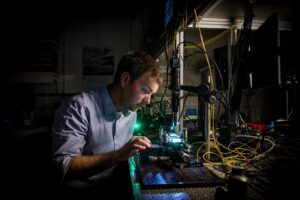
The Hub for Quantum Computing via Integrated and Interconnected Implementations (QCi3) brings together over 50 investigators across 18 universities to address key challenges in developing quantum computing, and deliver applications across diverse areas of engineering and science. Specifically, we focus on major elements where collaborative academic research bringing together broad expertise can enable transformative progress, including: (i) solving systems-level problems requiring collaboration across hardware, software, and user communities (ii) developing experimental capabilities to address technology development and problems that industry and academia see on the horizon, and (iii) creating strong links to applications scientists.
The Integrated Quantum Networks (IQN) Hub
Contact: IQN.Hub@hw.ac.uk
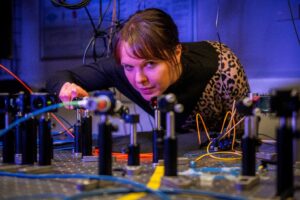
The Integrated Quantum Networks (IQN) Hub is a major UK-wide collaboration aiming to enable secure quantum networking at all distance scales. This will range from localised quantum computing networks through to satellite-based intercontinental communications. The Hub brings together the expertise of 13 leading UK Universities (Bristol, Cambridge, Edinburgh, Glasgow, Imperial College London, Oxford, Queen’s Belfast, Sheffield, Southampton, Strathclyde, Warwick, York, and the lead – Heriot-Watt), together with The National Physical Laboratory, RAL Space, and over 45 industrial partners to secure the UK’s leadership in quantum communications. The Hub is part of a £160M network of five new Quantum Technology Research Hubs, one of the key initiatives of the UK National Quantum Technologies Programme.
The central vision of the IQN Hub is to address the major global research challenges currently preventing full implementation of a so-called “quantum internet” — globally interlinked quantum networks, designed to co-exist with classical telecommunications network infrastructure, which connect quantum nodes via quantum information channels.
Our programme also includes development of the materials and components which will underpin scalable quantum networks. This includes new matter qubit platforms, single photon sources, detectors, and network switches. We are also closely supporting the development of new quantum communication protocols and theory, together with leading on new industry standards to support the commercialisation and wide-scale adoption of these technologies. By working closely with industry partners, national laboratories, policy makers and community stakeholders, the IQN Hub will help to establish a globally competitive quantum communications industry in the UK, and support the deployment of a secure, scalable, national quantum communications infrastructure.
Phase 1 and 2 hubs
These Hubs build upon Phase 1 and 2 Hubs, which preceded them:
- Quantum Computing and Simulation Hub (QCS)
- Quantum Communications Hub
- UK Quantum Technology Sensors and Timing Hub
- QuantIC – The UK Quantum Technology Hub in Quantum Enhanced Imaging
Building national capabilities
Combined activities and facilities across the programme will create a network of national and international capabilities for academia, industry and government. This will ensure the UK has assured capabilities across the technologies to meet societal, economic and national security objectives, and will build resilience into the sector and the wider economy.
National Quantum Computing Centre
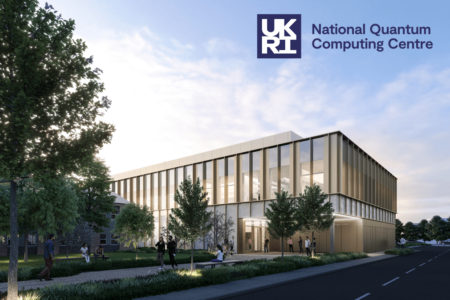 The National Quantum Computing Centre (NQCC) is a new research institution funded through UKRI, which is dedicated to accelerating the development of quantum computing by addressing the challenges of scalability. Working with partners across industry, government and the research community, the NQCC will create the necessary R&D capabilities through coordination and delivery of a technical programme, alongside the commissioning and operation of new facilities.
The National Quantum Computing Centre (NQCC) is a new research institution funded through UKRI, which is dedicated to accelerating the development of quantum computing by addressing the challenges of scalability. Working with partners across industry, government and the research community, the NQCC will create the necessary R&D capabilities through coordination and delivery of a technical programme, alongside the commissioning and operation of new facilities.
The programme will deliver assured quantum computing capability, enabling the UK to remain internationally competitive. The centre will be headquartered in a purpose-built facility at the STFC’s Rutherford Appleton Laboratory campus in Oxfordshire, which is due for completion in 2024.
- Read the latest NQCC Annual Report (PDF, 3.2MB)
- Sign-up for the NQCC’s Newsletter
The Quantum Metrology Institute at NPL
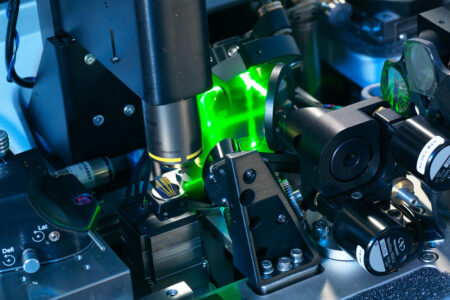
The Quantum Metrology Institute (QMI) at the National Physical Laboratory (NPL) was established in 2015 as part of the first phase of the NQTP. The QMI brings together all NPL’s capabilities in science, metrology and major facilities relevant to the understanding, development and test of quantum technologies. The QMI is a national capability for test and evaluation, accelerating the commercialisation of quantum technologies.
NPL teams work in collaboration with industry and academic partners across the country focused on multiple scientific areas including quantum clocks, quantum communications, quantum computing, quantum sensors and quantum materials. Facilities are available to test and characterise materials, components and systems from the full range of technology areas.
NPL offers schemes for industry to access these facilities and opportunities to collaborate with NPL scientists and engineers to address barriers to innovation, reliability and scaling of quantum systems.
To expand these national capabilities in support of the quantum economy, a new facility – the advanced quantum metrology laboratory (AQML) – has been constructed on the NPL Teddington site. The AQML will give NPL even greater capacity to support the UK in the successful commercialisation and adoption of quantum technologies.
SPEQTRE (Space Photon Entanglement Quantum Technology Readiness Experiment)
YouTube video
SPEQTRE (Space Photon Entanglement Quantum Technology Readiness Experiment)
Led by STFC RAL Space and Singapore technology company, SpeQtral, with satellite platform support from ISISPACE in the Netherlands, the mission aims to develop a secure communications satellite, demonstrating quantum key distribution (QKD) from space. The mission’s innovative and agile development process is expected to pave the way for more efficient and cost-effective space projects facilitating the secure transfer of quantum keys over global distances and tapping into a potential £11.5 billion market over the next decade.
SPEQTRE consists of a space and ground segment. It comprises an entangled photon transmitter and receiver (developed by SpeQtral) and an optical payload and ground station (developed by RAL Space). The UK element will deliver mission design and infrastructure that will provide UK quantum technologies an attractive risk/cost approach to space demonstration.
Research
Transformative technologies are rooted in science. Quantum technologies and the promise for society and economic growth they hold, are not an exhausted area, but an expanding one.
They naturally fall within a family of technologies – electronics, photonics and quantum – within which the UK already has significant strengths. For example, Oxford Instruments is a world leader in cryogenics. Control technologies are another area of strength. The photonics industry in the UK is world leading.
The hubs have made the UK one of the leading quantum research centres. That continuing success is built on the unique strength of the long-lasting partnerships that are forming between industry, research, government and technology; and which are also inter-disciplinary.
The NQTP takes a responsibility for ensuring that these rich and productive relationships across physics, chemistry, mathematics and engineering are sustained and encouraged. We are growing the UK portfolio of quantum science and technology research.
It is widely expected that new quantum tools, which are being developed, will grow further the opportunities for wider science applications.
Quantum Technologies for Fundamental Physics
Quantum Technologies for Fundamental Physics (QTFP) is a £40 million Strategic Priorities Fund (SPF) programme that aims to transform our approach to understanding the universe and its evolution.
The QTFP programme aims to demonstrate how quantum technologies can be utilised to investigate key fundamental physics questions such as the search for dark matter, the nature of gravity and measurements of the quantum properties of elementary particles, thus ensuring the UK remains a first rank nation in the physics and quantum communities around the world.






Driving commercialisation and industrialisation
Quantum technologies will create new markets and upend existing ones across many sectors.
The Industrial Strategy Challenge Fund (ISCF) for quantum technologies has stimulated commercial development, delivering the value, mentoring and opportunity that underpins the NQTP.
YouTube video
Interview with Sir Peter Knight
Businesses supported by ISCF with £153 million have raised £425 million in private sector financing since its programme started, twice the forecast estimate. That private sector support is expected to reach £715 million by 2025.
The Challenge has been successful in encouraging overseas companies, such as California-based Rigetti, to invest and collaborate in the UK. This is helping to build the supply chain infrastructure and expertise that will be crucial to sustain the UK as an independent, quantum power.
The Challenge fund helps fledgling ventures to collaborate with industry and academic partners; and to overcome the commercial and technical challenges they face. It forms a crucial part of the NQTP, one that helps all the most successful UK quantum ventures to find their commercial feet as they tread a path from research to market.
The NQTP is a crucial landing platform for spin-outs emerging from academia. It also serves as an entry point for interested end-users to explore commercial opportunities and develop prototype devices and products.
Commercialising quantum technologies
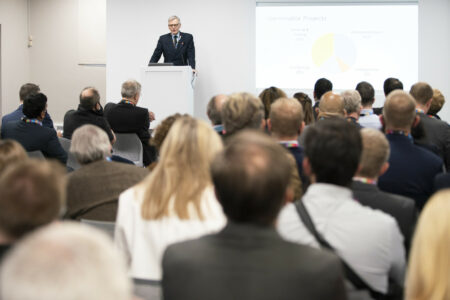
Major funding has been provided through the Industrial Strategy Challenge Fund in waves:
- ‘Wave 2’ (2018-2021) £20m awarded to collaborative, business led projects to develop quantum enabled devices. Projects will develop a quantum gravity sensor to detect hidden underground structures, a quantum clock for precise miniaturised timing, and quantum key distribution through satellites and fibres.
- ‘Wave 3’ (2020-2025) £153m, supported by £205m from industry, to develop new products and technologies based on advances in quantum science. This fund supports product and service innovations, industry-led technology development projects, the supply chain elements across the quantum sector and supporting early-stage, spin-out and start-up quantum technologies companies to secure venture capital. In 2020, £70m of this funding was committed to 37 projects involving over 80 companies.
- A directory of the ISCF funded projects is available.
UK-Canada collaboration programme
The UK and Canada are global leaders in the race to commercialise quantum technologies into new products, processes and services. In 2020, Innovate UK and NSERC (the National Science and Engineering Research Council of Canada) ran a joint call for business led bilateral projects to exploit opportunities for the commercialisation of quantum technologies in the two countries.
The competition was the first industry-led partnership between any two countries to develop quantum technologies, and followed an agreement signed between the two countries in 2017 to share quantum expertise through business and academic collaboration.
The eight winning projects will share grants of £2 million from UKRI and C$4.4 million total investments from Canada under the bilateral initiative.
National Quantum Strategy Missions
Introduction
In March 2023, the government published the National Quantum Strategy, where it committed to publishing long-term quantum missions to galvanise technology development towards ambitious outcomes.
With the biggest impacts for quantum technologies expected in the long-term, time-bound missions can crystallize where we want to get to as a country, focusing the activity and investment needed in the public and private sectors.
Since the publication of the strategy, the government has worked with industry, quantum experts, and investors to develop missions that will bring significant benefits to the economy and society such as:
- increased compute power that can deliver the next generation of drugs, chemicals, and materials;
- new navigation and timing systems to provide resilience and improved accuracy in the event of the denial of satellite systems;
- more precise sensors that deliver new capabilities to help monitor and maintain critical infrastructure, including seeing underground; and
- improved outcomes for patients across areas such as dementia, epilepsy, and cancer through earlier diagnosis and ultra-precise surgery.
Mission-led innovation
Pillar 4 of the UK Innovation Strategy recognises the role government can play in driving growth and supporting priority areas of the innovation system through a missions approach. Mission-oriented innovation – which comes in various forms – sets out to harness innovation through tackling major challenges faced by the UK and the world, catalysing growth and capability in priority technologies. The UK is a pioneer of such approaches, dating back to the Longitude Act of 1714, which inspired and incentivised innovators to invent a practical and reliable method for determining longitude to aid navigation at sea. More recently, rapidly developing, procuring, and manufacturing COVID-19 vaccines demonstrated a mission approach at its best, bringing together multiple organisations with a goal to protect UK citizens.
The quantum missions start with the technology and focus on achieving specific, ambitious outcomes that will have wide-ranging spillover benefits. For example, pulling through quantum sensing capabilities for infrastructure monitoring will have future impacts in developing advanced autonomous systems and drone technologies. They cover areas which are best suited to a mission focus on a particular outcome or outcomes that galvanise investment and collaboration. This means the missions vary in size and scope to best suit the needs of their area, rather than trying to achieve all outcomes the UK wants to reach on quantum technologies. To deliver the National Quantum Strategy, other approaches to stimulate innovation are also being deployed, across themes such as skills, acceleration programmes, and pro-innovation regulation.
Next Steps
In the coming weeks, the government will work with industry, academia, and investors to define the programmes that will help to deliver each mission. These programmes will set out the core activities and milestones that are necessary to unlock investment, advance the science, and develop and demonstrate these technologies in the real world. The ultimate goal is to advance the UK’s thriving – though currently nascent – quantum industry, laying the foundations for future benefits to be continuously unlocked in the decades to come. The programmes will also set out how we will work with international partners to deliver the missions.
If you would like to be part of this process and are not currently in contact with the Office for Quantum at the Department for Science, Innovation & Technology, please signal your interest by emailing ofqenquiries@dsit.gov.uk.
The Mission Headlines
Mission 1
By 2035, there will be accessible, UK-based quantum computers capable of running 1 trillion operations and supporting applications that provide benefits well in excess of classical supercomputers across key sectors of the economy.
Mission 2
By 2035, the UK will have deployed the world’s most advanced quantum network at scale, pioneering the future quantum internet.
Mission 3
By 2030, every NHS Trust will benefit from quantum sensing-enabled solutions, helping those with chronic illness live healthier, longer lives through early diagnosis and treatment.
Mission 4
By 2030, quantum navigation systems, including clocks, will be deployed on aircraft, providing next-generation accuracy for resilience that is independent of satellite signals.
Mission 5
By 2030, mobile, networked quantum sensors will have unlocked new situational awareness capabilities, exploited across critical infrastructure in the transport, telecoms, energy, and defence sectors.
Summary of the Missions
Mission 1: by 2035, there will be accessible, UK-based quantum computers capable of running 1 trillion operations[1] and supporting applications that provide benefits well in excess of classical supercomputers across key sectors of the economy.
We will do this through three mutually reinforcing core outcomes:
- To have competitive UK-based commercial capabilities across hardware, control architecture, and the supply chain that can enable performance in excess of 1 trillion coherent quantum operations;
- To combine this operational capacity with algorithm development and software capabilities to complete multiple useful calculations of significant value to the economy and society on a quantum computer – ones that are not practically possible on the world’s most powerful supercomputers. High impact will be achieved in the following sectors at a minimum: healthcare, finance, transport, defence, energy, and manufacturing; and
- To seamlessly integrate quantum computing into high performance computational workflows, enabling user access and widespread adoption, accompanied by user readiness support across the UK economy.
The mission will set out a scaled approach to achieving the mission, with industrial milestones including:
- By 2028, extending beyond the NISQ-era with 106 quantum operations, which will enable the exploration of applications associated with the simulation of chemical processes, helping to improve catalyst design for example.
- By 2032, demonstrating large-scale error correction capabilities with 109 quantum operations, with applications including accelerated drug discovery.
- By 2035, achieving quantum advantage at scale through reaching 1012(a trillion) quantum operations, enabling applications such as optimising the production of clean hydrogen.
Mission 2: by 2035, the UK will have deployed the world’s most advanced quantum network at scale, pioneering the future quantum internet.
To deliver on the broad opportunities that are presented by quantum technologies, they will need to become firmly integrated within our digital infrastructure, including priority Future Telecoms platforms such as satellite communications. This will transform the way we secure, transmit and compute our data. The mission will focus on achieving the following outcomes:
- Scale computing: A quantum network in 2035 will see clusters of quantum processors networked together within and between data centres to scale computing power, turbocharging our ability to unlock high impact applications. This outcome will be integrated with Mission 1.
- Nationwide connectivity: We will be able to connect researchers and users in major cities and locations across the whole of the UK, enabling them to share information in a quantum state to facilitate secure, trustworthy, and remote access to capabilities and data.
- Early commercialisation: This mission will support further testing, demonstration, and evaluation of near-term commercial opportunities in quantum communications and component technologies. This will build the supply chain and operational learnings, providing the stepping-stone needed for future networks.
- International: The opportunities are global and the UK will work with at least five other countries to collaborate on developing underpinning technologies and connectivity with international quantum networks, including through satellite links. The UK will also take a leadership role in developing quantum networking standards.
- Future Quantum Internet: At the end of the mission, the UK will have the capability to send quantum information from the local to the global scale and to exploit this for the benefit of our economy and society. This will be year 0 for what will become known as the quantum internet.
Mission 3: by 2030, every NHS Trust will benefit from quantum sensing-enabled solutions, helping those with chronic illness live healthier, longer lives through early diagnosis and treatment.
To deliver on the broad opportunities presented by quantum technologies to reduce costs and save lives, quantum-enabled products and services will need to become integrated within our NHS. This mission will build on early UK successes in the development of products to revolutionise healthcare capabilities and pull these through to adoption, providing a firm foundation to grow the UK quantum medical device industry sector.
The mission will also generate a pipeline of next-generation technologies which harness quantum physics to deliver early-stage diagnoses and improved surgical outcomes, across areas such as dementia, epilepsy, cancer, cardiovascular disease, infectious diseases, as well as quantum for life sciences.
Outcomes of this mission include:
- Brain Scanning: By 2028, quantum-enabled brain scanners will enable precision-guided surgery for children suffering severe neurological disease to improve recovery and outcomes. By 2030, adoption of these scanners in dementia will have enabled new research at scale – driving inward investment by global pharmaceutical companies developing dementia drugs.
- Cancer detection: By 2030, new quantum imaging technologies for breast cancer detection will be in use across hospitals in the UK, significantly reducing the need for unnecessary chemotherapy. Hospital trials across a wide range of cancer types will also be well advanced.
- Technology Pipeline: By the end of the mission, a transformative pipeline of healthcare and life sciences technologies will have emerged. This will include: ultra-sensitive rapid tests for infectious diseases; ultra-precise surgery to remove early-stage tumours; portable, quantum-enhanced imaging capabilities to enable rapid examination at bedsides; and new sensing platforms to provide new insights into disease evolution, early detection, and drug monitoring.
Mission 4: by 2030, quantum navigation systems, including clocks, will be deployed on aircraft, providing next-generation accuracy for resilience that is independent of satellite signals.
This mission will develop and commercially exploit quantum navigation systems that are small enough to be deployed on aircraft (amongst other transport systems), combining technologies such as quantum clocks, accelerometers, and rotation sensors/gyroscopes, as well as embedding technologies for ultra-precise mapping. It forms part of a longer-term aim to reach chip-scale – unlocking the ability to integrate these systems into mobile phone-sized systems – and will therefore include facilitation of the fabrication and manufacturing capabilities needed to achieve this. The approach will deliver on a core element of the government’s Position, Navigation & Timing (PNT) Policy Framework published on 18th October 2023 (point 10) to accelerate R&D into quantum navigation and the next generation of optical clocks. The mission will target outcomes to:
- Bridge the ‘valley of death’by pulling-through promising research in quantum navigation systems and demonstrating their integration into moving platforms, bringing together innovators, systems integrators and researchers towards a common goal.
- Reduce the size, weight and powerof current capabilities to enable systems integration and increase usability.
- Develop ‘adoption layers’to support understanding of the technology and how to embed it in wider transport systems.
- Demonstrate capabilitiesin real-world settings, de-risking adoption for businesses.
- Exploit the commercial opportunityby taking a UK lead in frontier navigation technology, opening up further opportunities across areas such as robotics and drones.
- Provide additional resilienceto the UK in the face of GNSS-denial through delivery of independent systems and more precise timing in the future.
Mission 5: by 2030, mobile, networked quantum sensors will have unlocked new situational awareness capabilities, exploited across critical infrastructure in the transport, telecoms, energy, and defence sectors.
This mission focuses on enhancing the capacity and resilience of critical national infrastructure. These will bring significant benefits in terms of reducing maintenance costs and supporting Net Zero ambitions across key sectors. It addresses core technological challenges across quantum sensing capabilities to integrate the technologies into existing systems. This mission will focus on accelerating the development of common technological capabilities to catalyse the private investment needed to pull through to adoption. By the end of the mission, key sectors will have deployed these new capabilities in industrial settings, with further exploitation opportunities around the world being realised. Expected applications include:
- Transport: These systems will revolutionise asset management and planning in the transport sector, unleashing underground sensing capabilities that improve the monitoring and maintenance of subsurface attributes.
- Telecoms: Provide next generation quantum-enabled sensors for capacity building and resilience. For example, high-bandwidth RF sensors or resilient optical links.
- Energy: Protect and support energy storage and transportation through quantum-enabled gas sensors to accurately see and measure emissions of greenhouse and other gases.
- Defence: The significantly increased ability through these systems to find objects in challenging environments will unlock a range of applications throughout the defence sector.
[1] 1 trillion operations refers to the current estimate of the computing power required to run a computational task of significant economic value. It is estimated such a task could take between a few minutes and a few days depending on the design of the computer. Timing expectations will be further defined as the mission programme progresses.
Skills
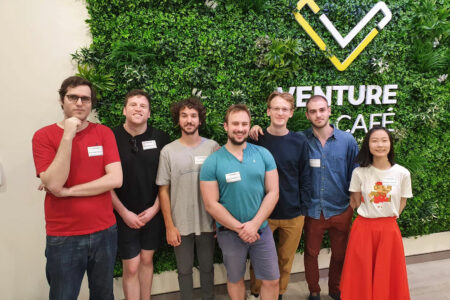
People and know-how are the most important elements of the emerging ecosystem. The UK needs a creative, agile and adaptable, diverse and networked workforce with the right balance of skills to ensure it benefits from opportunities in quantum technologies.
The NQTP aims to ensure doctoral training meets the skills demands within industry, while producing highly qualified researchers; ensure fellowships programmes attract and retain science leaders and future leaders; continue to engage the sector on skills needs for the future; support a diverse and inclusive research environment within quantum technologies; and raise the profile of quantum amongst the public and in syllabuses.
EPSRC Centres for Doctoral Training (CDTs)
In 2018, EPSRC funded 75 Centres for Doctoral Training, across the entirety of its remit, with a total value of over £440 million. Within this group of centres, several awards were made that support doctoral training within the field of quantum technologies, including:
- Centre for Doctoral Training in Delivering Quantum Technologies (University College London)
- Centre for Doctoral Training in Quantum Engineering (University of Bristol)
The Centres of Doctoral Training funded in the 2013 Centre for Doctoral Training call have taken in their last student cohort. These included the Centre for Doctoral Training in Quantum Dynamics (Imperial College); the Centre for Doctoral Training in Delivering Quantum Technologies (University College London) and the Centre for Doctoral Training in Quantum Engineering (University of Bristol).
Training and Skills Hubs
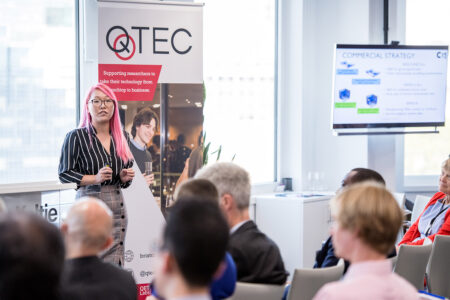
The Training and Skills Hubs in Quantum Systems Engineering are nodes within the national network of Quantum Technology Hubs and have delivered a package of skills training, co-working and mobility, and career development initiatives to develop high-level skills in quantum engineering. They have now taken in their last student cohort.
There are three Training and Skills Hubs in Quantum Systems Engineering:
- Training and Skills Hub in Quantum Systems Engineering: Imperial Centre for Quantum Engineering and Science
- Training and Skills Hub in Quantum Systems Engineering: innovation in Quantum Business – Applications, Technology and Engineering (InQuBATE)
- Training and Skills Hub in Quantum Systems Engineering: The Quantum Enterprise
Fellowships
The first phase of Quantum Technologies Fellowships 2015-2020 supported both the individuals and their teams to help realise the country’s potential. The fellowships were aimed at early and established career stage academics whose research focused on the direct exploitation of quantum phenomena to address the challenges of translation of quantum science through technology to eventual application.
The fellowships complemented the other components of the national programme and investments in Quantum Technology Hubs and Centres for Doctoral Training. The fellows developed potentially transformative research in areas that contribute to the development of novel quantum technologies.
EPSRC are in the process of funding a further round of fellows, with a number being co-sponsored by the National Quantum Computing Centre. The results will be announced in spring 2022.
PhD studentships
Since 2014, Dstl/MOD has funded over 60 quantum related PhD research studies at UK universities in support of the NQTP’s objective of engagement with academia. These studies focus on fundamental and novel research for enabling technologies and subsystems in both practical and theoretical terms for timing, imaging and sensing needs.
Common to partners, a key aspect of this research for defence and security is to decrease size, weight and power requirements of existing systems whilst still maintaining suitable performance.
During this same period, NPL has part funded and/or hosted over 75 quantum PhD students, many of whom have delivered their full research programme at NPL working with the NPL team. At the end of their research many have gone on to work within the UK quantum industry.
National Physical Laboratory skills programme
NPL support training and skills in quantum technology through their STEM Futures programme.
Quantum City
Quantum City seeks to raise the profile of quantum technologies amongst the public and schools to build the future quantum workforce and facilitate discussions about the role of these technologies in society.
It is an initiative that combines various groups within the NQTP to collectively provide coordinated and cohesive messaging around awareness of quantum technologies to society and their specific applications for various aspects of everyday life.
This initiative aims to encourage the uptake of STEM subjects and signpost career pathways in the fields of quantum science and technology development.
Case study
Bristol-based QLM Tech is developing a quantum gas imaging camera to offer continuous monitoring of terminals, rigs and other sources of emissions.
At the heart of QLM’s technology is a revolutionary combination of lidar and quantum single photon detection technology using a single photon avalanche diode (SPAD). Its quantum camera is the only solution that can provide affordable, scalable monitoring of greenhouse gas emissions at the facility scale on a continuous, autonomous basis.
On the eve of COP26, QLM carried out a successful first trial of the quantum gas camera at the real-world National Grid Gas Bacton terminal on the North Norfolk coast.
